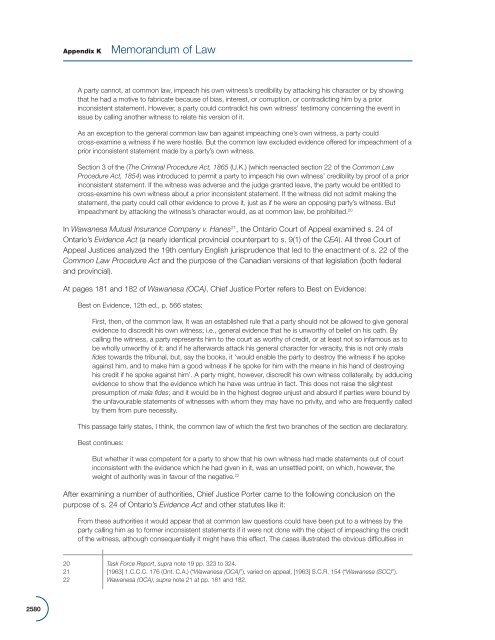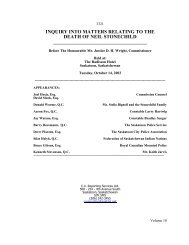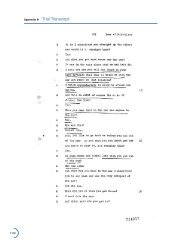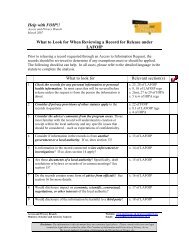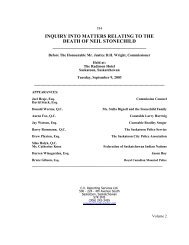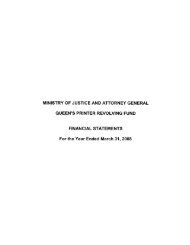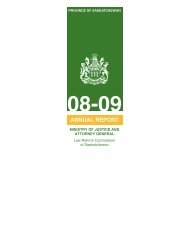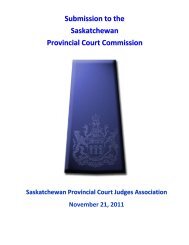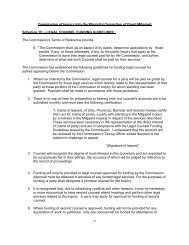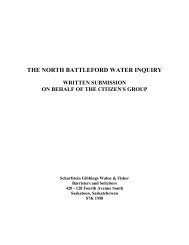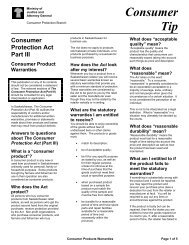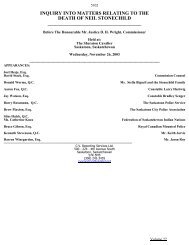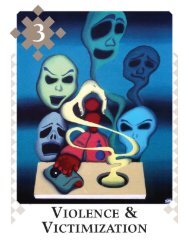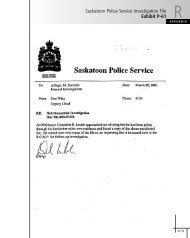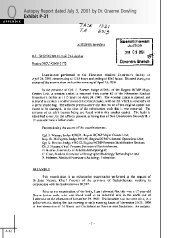Appendix K Memorandum of Law - s. 9(2) of the Canada Evidence Act
Appendix K Memorandum of Law - s. 9(2) of the Canada Evidence Act
Appendix K Memorandum of Law - s. 9(2) of the Canada Evidence Act
Create successful ePaper yourself
Turn your PDF publications into a flip-book with our unique Google optimized e-Paper software.
<strong>Appendix</strong> K <strong>Memorandum</strong> <strong>of</strong> <strong>Law</strong><br />
A party cannot, at common law, impeach his own witness’s credibility by attacking his character or by showing<br />
that he had a motive to fabricate because <strong>of</strong> bias, interest, or corruption, or contradicting him by a prior<br />
inconsistent statement. However, a party could contradict his own witness’ testimony concerning <strong>the</strong> event in<br />
issue by calling ano<strong>the</strong>r witness to relate his version <strong>of</strong> it.<br />
As an exception to <strong>the</strong> general common law ban against impeaching one’s own witness, a party could<br />
cross‐examine a witness if he were hostile. But <strong>the</strong> common law excluded evidence <strong>of</strong>fered for impeachment <strong>of</strong> a<br />
prior inconsistent statement made by a party’s own witness.<br />
Section 3 <strong>of</strong> <strong>the</strong> (The Criminal Procedure <strong>Act</strong>, 1865 (U.K.) (which reenacted section 22 <strong>of</strong> <strong>the</strong> Common <strong>Law</strong><br />
Procedure <strong>Act</strong>, 1854) was introduced to permit a party to impeach his own witness’ credibility by pro<strong>of</strong> <strong>of</strong> a prior<br />
inconsistent statement. If <strong>the</strong> witness was adverse and <strong>the</strong> judge granted leave, <strong>the</strong> party would be entitled to<br />
cross-examine his own witness about a prior inconsistent statement. If <strong>the</strong> witness did not admit making <strong>the</strong><br />
statement, <strong>the</strong> party could call o<strong>the</strong>r evidence to prove it, just as if he were an opposing party’s witness. But<br />
impeachment by attacking <strong>the</strong> witness’s character would, as at common law, be prohibited. 20<br />
In Wawanesa Mutual Insurance Company v. Hanes 21 , <strong>the</strong> Ontario Court <strong>of</strong> Appeal examined s. 24 <strong>of</strong><br />
Ontario’s <strong>Evidence</strong> <strong>Act</strong> (a nearly identical provincial counterpart to s. 9(1) <strong>of</strong> <strong>the</strong> CEA). All three Court <strong>of</strong><br />
Appeal Justices analyzed <strong>the</strong> 19th century English jurisprudence that led to <strong>the</strong> enactment <strong>of</strong> s. 22 <strong>of</strong> <strong>the</strong><br />
Common <strong>Law</strong> Procedure <strong>Act</strong> and <strong>the</strong> purpose <strong>of</strong> <strong>the</strong> Canadian versions <strong>of</strong> that legislation (both federal<br />
and provincial).<br />
At pages 181 and 182 <strong>of</strong> Wawanesa (OCA), Chief Justice Porter refers to Best on <strong>Evidence</strong>:<br />
Best on <strong>Evidence</strong>, 12th ed., p. 566 states:<br />
First, <strong>the</strong>n, <strong>of</strong> <strong>the</strong> common law. It was an established rule that a party should not be allowed to give general<br />
evidence to discredit his own witness; i.e., general evidence that he is unworthy <strong>of</strong> belief on his oath. By<br />
calling <strong>the</strong> witness, a party represents him to <strong>the</strong> court as worthy <strong>of</strong> credit, or at least not so infamous as to<br />
be wholly unworthy <strong>of</strong> it; and if he afterwards attack his general character for veracity, this is not only mala<br />
fides towards <strong>the</strong> tribunal, but, say <strong>the</strong> books, it ‘would enable <strong>the</strong> party to destroy <strong>the</strong> witness if he spoke<br />
against him, and to make him a good witness if he spoke for him with <strong>the</strong> means in his hand <strong>of</strong> destroying<br />
his credit if he spoke against him’. A party might, however, discredit his own witness collaterally, by adducing<br />
evidence to show that <strong>the</strong> evidence which he have was untrue in fact. This does not raise <strong>the</strong> slightest<br />
presumption <strong>of</strong> mala fides; and it would be in <strong>the</strong> highest degree unjust and absurd if parties were bound by<br />
<strong>the</strong> unfavourable statements <strong>of</strong> witnesses with whom <strong>the</strong>y may have no privity, and who are frequently called<br />
by <strong>the</strong>m from pure necessity.<br />
This passage fairly states, I think, <strong>the</strong> common law <strong>of</strong> which <strong>the</strong> first two branches <strong>of</strong> <strong>the</strong> section are declaratory.<br />
Best continues:<br />
But whe<strong>the</strong>r it was competent for a party to show that his own witness had made statements out <strong>of</strong> court<br />
inconsistent with <strong>the</strong> evidence which he had given in it, was an unsettled point, on which, however, <strong>the</strong><br />
weight <strong>of</strong> authority was in favour <strong>of</strong> <strong>the</strong> negative. 22<br />
After examining a number <strong>of</strong> authorities, Chief Justice Porter came to <strong>the</strong> following conclusion on <strong>the</strong><br />
purpose <strong>of</strong> s. 24 <strong>of</strong> Ontario’s <strong>Evidence</strong> <strong>Act</strong> and o<strong>the</strong>r statutes like it:<br />
From <strong>the</strong>se authorities it would appear that at common law questions could have been put to a witness by <strong>the</strong><br />
party calling him as to former inconsistent statements if it were not done with <strong>the</strong> object <strong>of</strong> impeaching <strong>the</strong> credit<br />
<strong>of</strong> <strong>the</strong> witness, although consequentially it might have this effect. The cases illustrated <strong>the</strong> obvious difficulties in<br />
20 Task Force Report, supra note 19 pp. 323 to 324.<br />
21 [1963] 1.C.C.C. 176 (Ont. C.A.) (“Wawanesa (OCA)”), varied on appeal, [1963] S.C.R. 154 (“Wawanesa (SCC)”).<br />
22 Wawanesa (OCA), supra note 21 at pp. 181 and 182.<br />
2580


